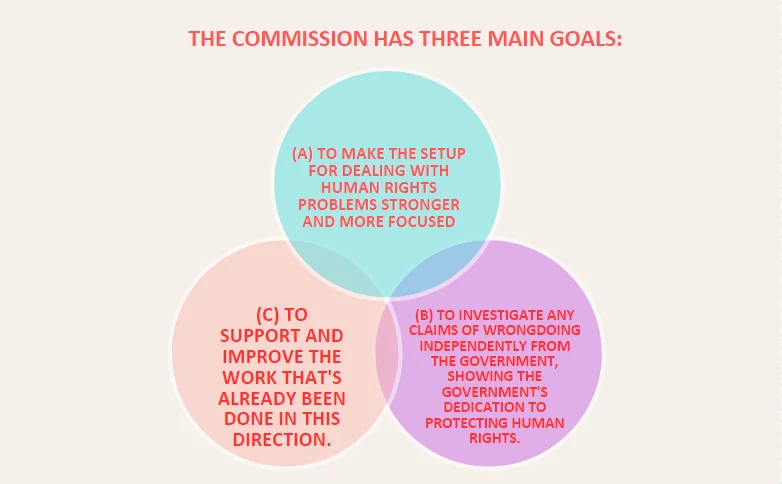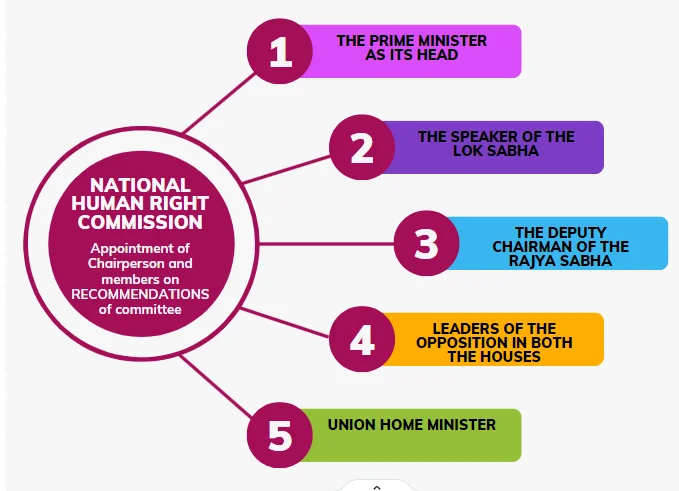Human rights are inherent to all individuals simply by virtue of being human. These universal rights, which include the right to life, food, education, work, health, and liberty, are not granted by any state but are fundamental to human existence. The National Human Rights Commission (NHRC) of India, established under the Protection of Human Rights Act of 1993, is dedicated to safeguarding and promoting these rights. The NHRC operates in accordance with the Paris Principles, ensuring it functions independently, efficiently, and with a broad mandate to protect human rights.
To deny people their human rights is to challenge their very humanity. -Nelson Mandela
Enroll now for UPSC Online Course
National Human Rights Commission (NHRC)
The Paris Principles
- Introduction to Human Rights: Human rights are rights we have simply because we exist as human beings – they are not granted by any state.
- These universal rights are inherent to us all, regardless of nationality, sex, national or ethnic origin, color, religion, language, or any other status.
- They range from the most fundamental – the right to life – to those that make life worth living, such as the rights to food, education, work, health, and liberty.
- The Paris Principles: Framework for National Human Rights Institutions
-
-
- The Paris Principles are a set of international guidelines that frame the operation of national human rights institutions (NHRIs).
- They were adopted by the United Nations General Assembly in 1993.
- The Paris Principles outline the fundamental criteria that NHRIs need to meet for effective operation and independence.
-
- These principles include:
- Broad mandate, so that National Human Right Institutions are able to promote and protect all human rights
- Broad functions, so that National Human Right Institutions are able to deliver on their mandate by providing advice, reporting and monitoring, handling complaints and human rights education, among other “responsibilities”
- Independence from government, set out in legislation or the Constitution
- Pluralism, to ensure that the composition of National Human Right Institutions reflects the “social forces (of civilian society) involved in the promotion and protection of human rights”
- Adequate powers, so that National Human Right Institutions can initiate inquiries and investigations, gather the evidence and documents they need, consult with NGOs and State institutions and publicize their reports, findings and recommendations
- Adequate resources, so that National Human Right Institutions have the funding, staffing, infrastructure and institutional capacity to perform their functions and discharge their responsibilities
- Cooperative work, recognizing that effective human rights work requires National Human Right Institutions to collaborate with other State institutions, NGOs and civil society groups
- International engagement so that National Human Right Institutions can contribute their knowledge and expertise to international and regional human rights bodies and mechanisms.
- India’s Commitment to Human Rights: The Protection of Human Rights Act of 1993: India enacted the Protection of Human Rights Act of 1993 for the safeguard and promotion of human rights, reflecting the country’s commitment to upholding these rights as enshrined in its Constitution and international agreements such as the Paris Principle.
| Salient Features of the Protection of Human Rights Act, 1993 | Description |
| Establishment of the National Human Rights Commission (NHRC) |
|
| Establishment of State Human Rights Commissions (SHRCs) |
|
| Empowerment of the Supreme Court and High Courts |
|
| Recognition of International Human Rights Treaties |
|
| Provision for Legal Aid |
|
National Human Rights Commission (NHRC)
The National Human Rights Commission (NHRC) of India is a Statutory ( non-constitutional) body, established on 12 October 1993.
- Establishment: Established under the Protection of Human Rights Act (PHRA), 1993 as amended by the Protection of Human Rights (Amendment) Act, 2006.
- Definition of Human Rights in PHRA: PHRA defines Human Rights as the rights relating to life, liberty, equality, and dignity of the individual guaranteed by the Constitution or embodied in the International Covenants and enforceable by courts in India.
- Conformity with the Paris Principles: It is in conformity with the Paris Principles, adopted at the first international workshop on national institutions for the promotion and protection of human rights held in Paris in October 1991, and endorsed by the General Assembly of the United Nations.
Vision and mission
- The National Human Rights Commission (NHRC) of India was established to safeguard and promote human rights.
- As outlined in Section 12 of the Act, the Commission not only investigates complaints of human rights violations or negligence by public servants but also examines international human rights treaties and instruments, providing recommendations for their effective implementation to the government.

Composition
- Key Members– The commission is a multi-member body consisting of a chairperson and five members.
| Position | Qualification |
| Chairperson |
|
| Member 1 |
|
| Member 2 |
|
| Rest 3 Members |
|
| Ex-Officio Members |
|
| Special Invitee |
|
Appointment
- The chairperson and members are appointed by the President on the recommendations of a six-member committee consisting of

Tenure
- The chairperson and members hold office for a term of three years or until they attain the age of 70 years, whichever is earlier.
- They are eligible for re-appointment. After their tenure, the chairperson and members are not eligible for further employment under the Central or State government.
Removal
- The President can remove the chairperson or any member from the office under the following circumstances:
-
- If he is adjudged an insolvent; or
- If he engages, during his term of office, in any paid employment outside the duties of his office; or
- If he is unfit to continue in office by reason of infirmity of mind or body; or
- If he is of unsound mind and stand so declared by a competent court; or
- If he is convicted and sentenced to imprisonment for an offense.
- In addition, the President can also remove the chairperson or any member on the grounds of proven misbehavior or incapacity.
- However, in these cases, the President must refer the matter to the Supreme Court for an inquiry. If the Supreme Court, after the inquiry, upholds the cause of removal and advises so, then the President can remove the chairperson or a member.
Salary and allowances
- The salaries, allowances, and other conditions of service of the chairperson or a member are determined by the Central government.
- But, they cannot be varied to his disadvantage after his appointment.
- The rules mentioned above are designed to ensure that the Commission operates independently, fairly, and impartially.
Enroll now for UPSC Online Course
| Must Read | |
| Current Affairs | Editorial Analysis |
| Upsc Notes | Upsc Blogs |
| NCERT Notes | Free Main Answer Writing |
Conclusion
The NHRC plays a crucial role in protecting human rights in India, empowered by legislation and guided by international principles.
- Its structure, including a diverse composition of members and ex-officio participants, ensures a comprehensive approach to human rights issues.
- By providing a platform for addressing human rights violations and upholding international treaties, the NHRC stands as a testament to India’s commitment to human dignity and justice.
Sign up for the PWOnlyIAS Online Course by Physics Wallah and start your journey to IAS success today!
| Related Articles | |
| National Human Rights Commission (NHRC) in India | UNGA’s 78th Session |
| Constitution: A Living Document | Supreme Court |

 GS Foundation
GS Foundation Optional Course
Optional Course Combo Courses
Combo Courses Degree Program
Degree Program









